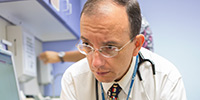
As with many vulnerable populations, for those in our region who don’t speak English and are without health care coverage, the coronavirus pandemic has been a frightening threat. To speak directly with them in their primary language and to answer pressing questions, Diego Chaves-Gnecco (MMPH ’00) was among the hosts of Facebook Live event from Casa San Jose a support organization for Pittsburgh’s Latino community and UPMC Children’s Hospital of Pittsburgh’s Salud Para Niños, a bilingual pediatric clinic where Chaves-Gnecco is program director and founder.
The presentation came about due to concern about how COVID-19 is affecting minority communities, in particular the Latino community. “I also have been very concerned about the lack of appropriate and trusted information in Spanish directed to the Latino community of Southwestern Pennsylvania. Simultaneously, I got several requests from different community leaders and members to have a presentation in Spanish like the one that we did,” said Chaves-Gnecco.
During the presentation, Chaves-Gnecco addressed concerns about leaving the house for shopping, washing hands, sharing living space with an infected person, issues of insurance and sick days and jobs that don’t permit distancing, and issues of age and complicating health conditions. He also spoke at length about symptoms and distancing for children, and where to find more helpful resources in our city. “This is a difficult moment for everyone. Don’t be afraid to ask for help,” he emphasized. “We’re in this together.”
The presentation was a success, reaching 2,470 people with 634 engagements, 78 comments, and 55 shares all during the live presentation itself. Participants were thankful for the information and that the presenters took into account specific aspects related to the Latino community.
Chaves-Gnecco has done a few other presentations, both in English. One with the American Academy of Pediatrics Pennsylvania Chapter entitled: Invisible in the Time of COVID-19 – What Pediatricians in Pennsylvania can do to support the Latino community. And the second was with the University of Pittsburgh Center for Latin-American Studies entitled: Invisible in the Time of COVID-19 – What we all can do to help the Latino community. Over 60 members of the community including faculty and students attended each of these presentations.
He sees how the COVID-19 pandemic has affected Pittsburgh’s Latino community via an initiative from Pitt’s Medicine’s Department of Pediatrics called The Pittsburgh Study – The Family Strengths Survey. The pandemic has affected many socio-economic determinants of health including food insecurity, unemployment, lack of financial resources, struggling in many other areas. “While we also know that there have been members in the community who have contracted COVID-19, we currently don’t have specific statistics about how many Latinos have been diagnosed with COVID-19, how many have been hospitalized, how many fatalities due to COVID-19 have been in the Latino community in Allegheny County, in Southwestern Pennsylvania and in the state of Pennsylvania,” says Chaves-Gnecco.
When asked about the successes of the community, he said that people have shown resiliency. “I have been particularly encouraged by the resilience of the Latino community: the fact that many families were able to survive almost three months without financial support, without employment, without food, without qualifying for the federal stimulus or for unemployment benefits. I am also encouraged by the support of local community organizations like Casa San Jose, the AIU Latino Family Center and the Latino Community Center. I am also hopeful that in some point, we will have demographic statistics about COVID-19 in the Latino Community from the Allegheny County Health Department and from the Pennsylvania Health Department.* The biggest concern that we all have is about the possibility of a second peak of the pandemic in the community.”
Chaves-Gnecco has the following simple but extremely important rules for his patients:
- wash your hands thoroughly as many times as you can every day
- maintain physical distancing (2 mts – 6 feet between two people)
- wear a face mask
- check yourself for symptoms such as cough and fever and if you are being screened at work or at school report these symptoms
- be willing to make a change in culture by incorporating the previous recommendations in your daily living activities and avoid common cultural practices until now acceptable such us hugging, kissing, hand shaking.
- finally be optimistic, have faith and know that we are in this pandemic together and together is the way that we can address the needs of our community and prevent the spread of the infection.
“I am humbled by the fact that I might be able to help others with my work not only in the clinic but in the community and outside of the exam room.”
Patricia Documet (BCHS ’95, ’02), associate professor and director of the doctoral program in the Department of Behavioral and Community Health Sciences, and director of Latinx research and outreach in the Center for Health Equity, is board president for Casa San Jose.
*This interview was given on June 9. On June 12, ACHD published data for the first time about COVID-19 in the Latino population in Southwestern Pennsylvania. The ACHD acknowledges that there is still not data about ethnicity in all testing and in all case.
6/26/2020